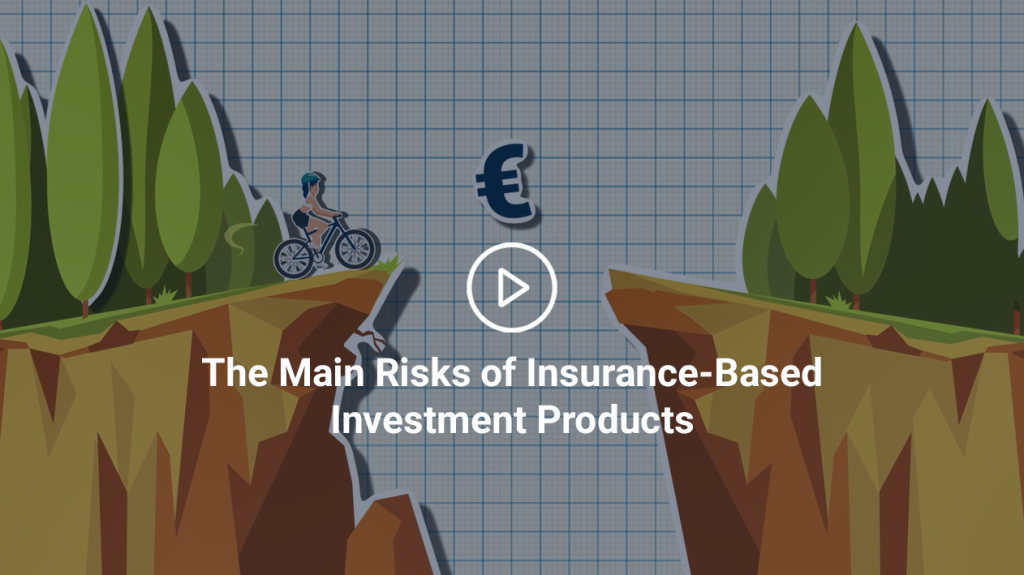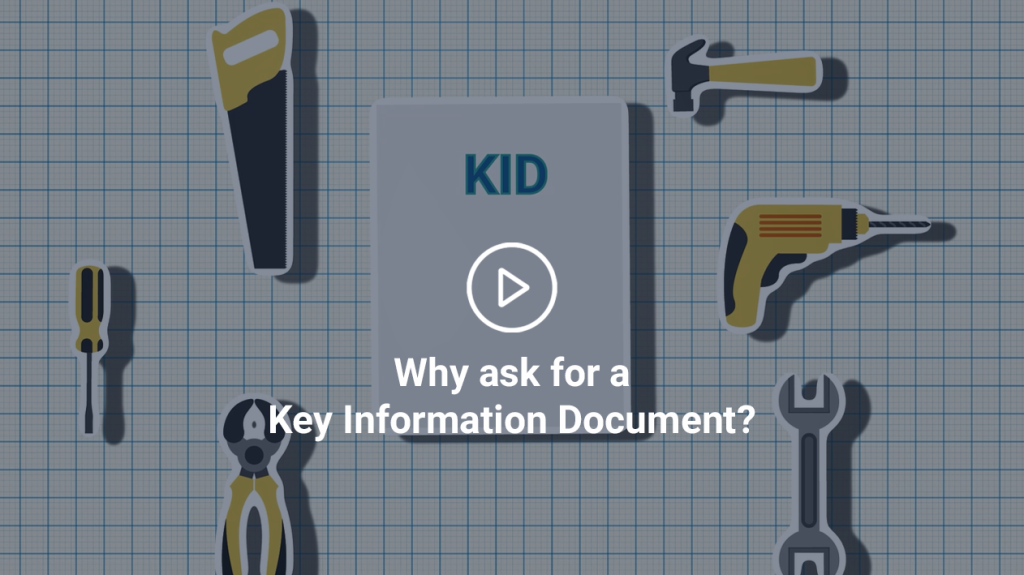Consumer Awareness and Campaigns
Conduct supervision aims to ensure an appropriate degree of protection for consumers of financial services. Consumer protection lies at the heart of conduct supervision. The MFSA protects consumers from the harm that can be caused by the misconduct of firms. This is done in a variety of ways. One fundamental tool used by the MFSA for the appropriate protection of consumers is consumer education – educating consumers of their rights and duties.
The MFSA therefore, not only seeks to ensure that consumers are made aware of the products and services they are purchasing through the provision of enough information, but also that they are aware of their rights and duties with respect to the same products and services.
Empowering consumers through education, allows consumers to make informed decisions when purchasing financial products and services.
From Tap to Transfer – Making Sense of Banks and Payment Service Providers
Every time you pay for your groceries, book a ride, or shop online, you’re using a financial service – either a bank or a financial institution, even if you don’t realise it. The world of payments is a fast-paced environment where new methods of payment are constantly being developed.
The payment sector is a core component of the financial system which enables modern economies to function smoothly, where consumers and merchants need to have effective and convenient means of making and receiving payments.
Click here to learn more.
Bonds 101: Understanding Your Investment Options
While they are often seen as safer investments compared to stocks, bonds still come with their own set of risks. Investors should approach an investment in bonds with an open mind, focusing not only on the rate of interest (also referred to as coupon) but also giving weight to other variables.
Keep reading here – whether you’re a curious newbie or just looking to brush up, we’ve got you covered.
Go Sustainable – Dodge Greenwashing!
Over the years, the issue of environmental degradation and its undesirable consequences (such as pollution) have negatively impacted our planet. The concept of Sustainable Finance is about financing the transition to a resilient and climate neutral economy. This is done by channelling money towards activities which do not continue to cause this harm. In other words, the goal of sustainable finance is to promote economic development while also positively contributing towards environmental and social issues.
However, this target would not be possible without the involvement of financial institutions, such as banks, investment services providers and insurance companies, who play an important role in channelling investors’ money towards financial green products.
Let’s get started here!
Unlocking the World of Crypto
Are you curious about crypto-assets and how they work? Do you want to learn more about the benefits and risks of using them?
Crypto-assets provide a new and exciting way to manage and move money in the digital age. Let’s explore what is their impact on the financial services sector, the advantages they offer over traditional money, how to buy them, the risks you should be aware of, and common scams and attacks to watch out for.
Let’s get started here!
Inflation: How It Affects Your Finances
Have you ever felt like your money just isn't stretching as far as it used to? Week in week out, you buy the same things, yet the bill seems to be increasing! This could be due to inflation.
What is inflation, and how does it impact your finances? More importantly, what you can do to mitigate its effects?
Learn more here.
Bank Loans and Credit Cards
How can I choose banking products or services that are in line with my needs?
Banks offer a wide variety of banking products with different features, fees, interest rates, and which essentially provide exposure to different types and levels of risk.
Different banking products and services often serve different purposes. So how do you decide which product, service and provider are best for you?
Find out more here.
FinTech: Risks and Benefits
From the use of contactless payments to cryptocurrency and digital banking, it is no surprise that the era that we are living in has been dubbed as the “FinTech” Revolution.
Short for financial technology, FinTech involves the use of technology to access financial services, transforming the way financial transactions are being carried out. But how does it differ from digital finance and what are the risks that you should be aware of when using FinTech products or services?
Learn more here.
Insurance-Based Investment Products
When looking at the type of financial instruments that you can invest in, you may be faced with plenty of options. One particular product combines insurance with investment – this is what we call an insurance-based investment product, or IBIP for short.
In 2021, the MFSA carried out several inspections at banks and insurance companies to monitor the manufacturing and distribution of insurance-based investment products. This was done as part of our work as a regulator to ensure that customers are being offered these products in a fair and transparent manner. An IBIP is a risky product, so one needs to be extremely aware of what they are going in for before committing to it.
Would you like to become more familiar with what an IBIP is exactly, and the risks that come with it? Read on to find out.
Let’s cover the basics - what is an insurance-based investment product?
An insurance-based investment product, or IBIP, is a financial product with both an insurance and an investment component; when you buy an IBIP you are getting a life cover and, in the meantime, you are investing either directly or indirectly in the financial markets.
Since the performance of an IBIP is dependent on market conditions and fluctuations, it is vital to understand the risks tied to it before purchasing one.
What are the main types of IBIPs?
Everyone is looking for something that’s low risk with the highest possible return, but in most cases, the higher the return promised, the higher the risk that comes with it, and IBIPs are no exception.
There are two main types of IBIPs, with a different risk-return trade off.
Type #1: With-profit products
With-profit IBIPs offer participation in an investment made by the insurance company, in a with-profits fund.
This type of IBIP provides you with annual bonuses, calculated on:
- Your investment value
- The performance of the fund you are investing in
- Other specific criteria fixed by the insurer
Additionally, you will usually receive a bonus at the end of the agreed termination date – however you will not receive this if you terminate the policy earlier than agreed.
The amount invested at the beginning, which we refer to as ‘your capital’, as well as the bonuses may also be guaranteed, but the amount received will depend on how the with-profit fund performs. There may be additional conditions attached to this, so make sure to read these well before your purchase.
Type #2: Unit-linked products
This kind of IBIP invests your money by purchasing units of an investment fund, usually offered by third parties. The value of these units depends directly on the investment fund.
In this scenario, your investment is not guaranteed as it relies on market conditions and fluctuations, so you must constantly monitor the value of the funds in order to take necessary action. Therefore, although you might get the chance for higher returns, this type of IBIP comes with higher risk, since you are wholly exposed to market fluctuations.
You also need to know that some IBIPs combine with-profit and unit-linked products, such as with-profit products exposed partly to market fluctuations. These products are usually referred to as hybrid products.
When am I expected to make payments for my investment?
This depends on whether the product is a single premium or regular premium policy.
- Single premium requires you to pay your amount in full, before the policy starts.
- Regular premium requires you to pay at regular time intervals throughout the duration of the policy (e.g. monthly or yearly).
The best option for you is subject to your particular circumstances, as both options have their positives and negatives.
What risks should I look out for?
- Be prepared to get a lower amount than anticipated, in cases where the markets have moved against you
- Be ready to be in it for the long haul as IBIPs are often recommended for a long period of time – from 10 to up to 15 years
- Be mindful of any fees that you will incur should you wish to terminate your policy earlier
- And if you surrender the policy early, note that the performance of your investment may be lower than originally expected.
Where can I find out more about the details and risks tied to a specific IBIP?
The KID – Key Information Document – should be your primary go-to source of information for that particular IBIP that you are interested in investing in.
This is a ‘consumer-friendly’ document containing all the essential information about the IBIP in maximum three pages. It also has a standardised format which the service providers are obliged to use so that you can easily compare different products before you make a purchase.
Think of the KID as your handbook, covering the following details:
- What the product is, along with its objectives and who it is intended for
- The level of risk it contains, in a form of a risk indicator with a score from 1 (lowest-risk) to 7 (highest-risk)
- What you can get in return
- What the costs are
- What happens if the insurer is unable to pay out
- The recommended holding period
- Options for earlier termination
- What you can do if you need to need to lodge a complaint
If you need any further clarifications or assistance, do ask your service provider to explain and be mindful of advice offered.
Ready to invest? Before you do, make sure you check off all these boxes:
- I understand what an IBIP is and how it works
- I accept that the payout that I will get at the end may be less than the amount
- I invested at the time of purchase
- I acknowledge that IBIPs vary from one another
- I have read carefully the terms and conditions of the product
- I am aware of the costs involved
- I have consulted the Key Information Document (KID)
Invest Smartly

As a regulator, the MFSA is dedicated to safeguarding the interests of consumers of financial services as well as ensuring market integrity. One of the ways in which we accomplish this mission is through educational campaigns aimed at helping consumers to achieve their financial goals and protecting them as the investment world becomes increasingly dynamic.
Investor Education empowers the general public with the tools, skill and knowledge to make sound financial decisions throughout life, making investment products more accessible and inclusive.
In line with this, we have embarked on a programme with the objective to raise awareness and provide an educational platform pertaining to financial investment.
This page includes frequently asked questions (FAQs) and answers related to financial investments, including those with a focus on Sustainable Finance.
What should I do before making any investment decision?
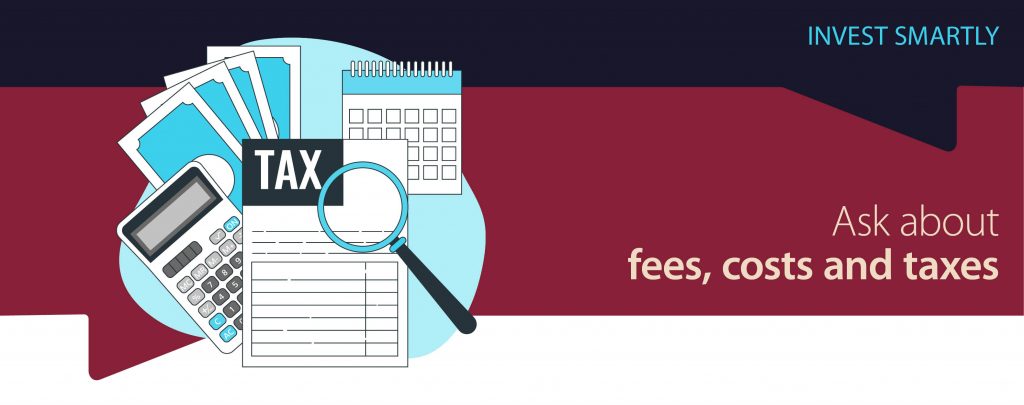
Before making investment decisions you must empower yourself through information about the risks and rewards of investing. This can help you avoid any potential losses.
As a smart investor:
- Ask questions. Do not make rapid investment decisions without considering your long-term financial goals.
- Avoid circumstances that can lead to fraud. Make sure the firm you are dealing with is authorised to provide investment services in Malta by the MFSA and/or by an EU Financial Services Authority. Please check by searching the Company on the Financial Services Register at the following link: https://www.mfsa.mt/financial-services-register/.
- Consider alternatives. Prior to committing to a particular Investment Services Provider, do consider what other authorised Investment Services Providers are offering in terms of service and value.
- Bear in mind that past performance is no guarantee of future returns.
- Be mindful of the investment service that you are being offered. Ask the representative of the authorised Investment Services Provider to explain to you the difference between an advisory and a non-advisory investment service.
- Read all documents carefully and obtain clarifications in case of need especially before signing-off any documentation. Always keep copies of all investment documentation.
- Be informed about all costs and associated charges in relation to the provision of investment services, including the cost of the financial instrument recommended or marketed to you. In relation to investment advisory services, you should also be provided with the cost of the advice.
- Remember that you may have to pay taxes on any profits you make.
- Get adequate reports on the investment services provided and ensure that you read through them.
- Take note of the authorised Investment Services Provider’s Complaints Policy.

What type of investment services are available and what should I expect?
You should be aware that different investment services are available, according to the degree of support (if any) you are looking for.
Typically, the most common forms of investment services are the following:
- The provision of investment advice whereby investors are provided with personal recommendations on the investments products that would be suitable for them (i.e. advisory service and portfolio management);
- The purchase or sale of financial products on a non-advisory basis (therefore without receiving investment advice); or
- The purchase or sale of financial products on an execution-only basis
If you opt for investment advisory services and portfolio management services, the investment firm’s representative will ask you several questions to understand your investment objectives (including your attitude to risk), your knowledge and experience and your financial circumstances so that he/she can select a suitable financial instrument or investment portfolio. These questions form part of the Suitability Test. It is in your best interest to provide all relevant information to the authorised firm’s representative. In the case of investment advisory service, do make sure that you are provided with a copy of the Suitability Report, before proceeding with the transaction. This document should outline how the advice meets your investment preferences, objectives and other characteristics.
If you want an investment firm to buy or sell on your behalf a financial product without providing you with advisory or portfolio management services, you will only be asked questions on your knowledge and experience relating to the specific investment. This is referred to as the Appropriateness Test. You may be provided with warnings in case the product is not appropriate for you or the information provided is not sufficient to determine the appropriateness or otherwise of the financial product.
In certain instances, and only for some types of financial instruments (referred to as “non-complex products”), you may invest without even being subject to the Appropriateness Test. This service is referred to as Execution Only service. In this case the firm will warn you that is not exercising any judgement on your behalf.
What does the term ‘nominee’ mean?
A nominee service means that an investment firm is authorised to hold your funds and investments on your behalf in separately designated clients’ money and clients’ asset accounts. These accounts are ringfenced from the Company’s own accounts. Nominees will act according to your instructions. It is important to ask the representatives of the investment firm if your funds and assets will be held in a nominee account before you start investing.
Do I have to pay fees for investing in a financial product?
Depending on the product and/or service you may be required to pay different costs and charges that will be disclosed to you before you take an investment decision. It is important that you understand the costs and are aware of the impact that the fees you have paid, or that you will be required to pay, have on the investments, especially on the return that you expect from it. Fees should be communicated in a timely manner, be complete and easy to understand and should make it easy for you to compare such charges with alternative products available in the marketplace.
Can I invest without risk?
The short answer is “no”. When investing, you will always be exposed to a certain amount of risk. It is important that you remember that, in general, higher and more tempting returns mean higher risks. Before you invest, you must carefully consider the risk which you may be exposed to.
There are, however, ways to reduce risk.
- Be wary of investment schemes that are presented in a way to make you believe that there are no risks related to the investment (such as "get rich quick", "can't lose", etc..)
- Do your own research, even if the product you want to invest in has been endorsed by a celebrity or an influencer.
- Know your timing. If you will need your money in the near future, it might not be a good idea to invest in the stock market as if there are any drops in value, there may not be enough time to regain the original value.
- Diversify your investment. Put your eggs into different baskets so that if one gets dropped, you don’t lose everything. Regularly check your portfolio.
- If you need help, speak to a professional financial adviser.
What does portfolio diversification mean?

A smart investor does not put all his eggs in one basket. The main benefit of portfolio diversification is to lower the risk of a single event from harming your investments. A diverse portfolio may include a combination of investments such as stocks and bonds issued by different companies operating in different industries, currencies and commodities.
Even if you observe that your investments are performing well, you should be aware that past performance is not indicative of future results, and that is why you should protect yourself from adverse market cycles and volatility through portfolio diversification. An optimally diverse investment portfolio will help you generate good returns and preserve your wealth.
I would like to invest in crypto-assets, is there anything I should be aware of?
With crypto assets all over the news it's tempting to dive right in. Crypto-assets are digital assets being a digital representations of value that can be transferred, stored and traded electronically by using cryptographic techniques.
These are risky investments whose value can change rapidly and unpredictably. Examples of crypto-assets are the Initial Coin Offerings (ICOs), which are often issued by startups as a fundraising method. When dealing with crypto-assets, given the decentralised and anonymous nature of these instruments, you should look for as much information as possible, with particular reference to the identity of the issuer and refrain from investing if you do not have sufficient knowledge to understand the nature of these products and/or detect any red flag that could possibly lead to scam or fraud.
Local bonds and shares listed on the Malta Stock Exchange are approved by the MFSA, does this mean that they are risk free and that my capital is guaranteed?
No. The MFSA checks that the information included in the prospectus meets the standards of completeness, comprehensibility and consistency required by European law and that the company issuing those bonds satisfy the conditions stated in the Capital Markets Rules. All investments carry risk. In general, higher returns mean higher risks.
Remember that an investment in local bonds and shares are NOT covered by any guaranteed schemes.
What is the difference between a guarantee and a security?
These two distinct terms are sometimes used interchangeably. In simple terms, a guarantee is a “promise” by another person usually an operating company within the same group as the issuer, to honour the payment of Bond interest and principal, should the issuer fail to pay the bondholders.
On the other hand, a security takes the form of an issuer’s assets which is segregated from the rest of its assets and held by a third party, usually a security trustee, to be sold or used to the benefit of the bondholders, should the issuer fail to pay bond interest and/or the principal.
Always look out for dependencies between the guarantor and the issuer as sometimes the failure of an issuer to pay its dues means that the guarantor is not in a very good financial position.
Can I lose my capital even if the bonds are guaranteed or secured?
Yes. If there is a good chance that the security loses its value or that the guarantor’s business fails, then there is a risk that you lose part or the full amount being invested. It is important that you understand the value of the security and the guarantee when investing in the first place.
Look for the risk factors relating to the guarantee and security which are indicated in bold in the prospectus.
Where can I find relevant information when investing in local bonds listed on the Malta Stock Exchange?
Companies issuing bonds to be listed on the Malta Stock Exchange need to prepare a prospectus. This document may be lengthy but provides a lot of information which would help you make your investment decision.
Always base your decisions on formal information such as prospectus and company announcements issued by the company rather than hearsay, newspaper articles and information on social media platforms.
What should I do if I get to know that the company I invested in is in financial trouble?
Do not panic and do not take hasty investment decisions like selling off your investment. It is important to gather all the information available to you through formal channels of communication such as company announcements, circulars sent by the company and financial statements issued by the company. Once you have all the information, assess your position and take your decision. If you are not sure about the decision, consider speaking to an investment adviser to assist you.
Always keep up to date with the affairs of the company in which you have invested. Listed companies on the Malta Stock Exchange must have a section dedicated to Investors Relations on their website.
Digital Banking Awareness
In simple terms, digital banking means that the traditional banking services are now offered through digital or online means. Amongst the services which are available on the digital banking platforms, you are able to transfer funds from your bank account to another; manage your bank account; request information on transactions carried out; check your bank account balance; manage your personal or home loans; pay bills or top up your mobile phone. These are all activities or services which are typically provided by banks and are also available at your local bank branch. Digital banking provides a convenient, easy and secure way of carrying out your banking services from the comfort of your home, any time, from your personal computer or laptop and also anywhere else by downloading your bank’s mobile app on your smartphone or tablet.
It is important to always check which services are available to use through digital banking with your respective bank. Provision of services may vary from one bank to another or depending on the device used (whether computer or smartphone). You also need to check with your bank whether any fees will apply.
Discover the Convenience of Digital Banking
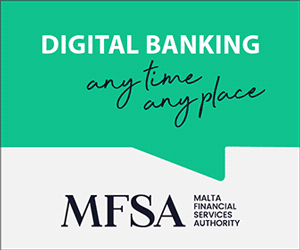
Digital Banking is considered to be relatively safe and banks providing this service would have invested in security measures, however it is always better to be informed and vigilant of what to watch out for:
- Consider significant threats and risks you might encounter whilst downloading the software via the internet. Ensure that the software is genuine and has not been tampered with. Ensure that the security components (antivirus, firewalls, security patches) are installed on your personal devices and updated.
- Use the genuine internet website of the bank. Never access the bank’s website through links contained in emails or SMS, unless you are sure of the identity of the sender. It is always best to access the bank’s website by typing in the web address, as provided by the bank, directly in the browser.
- Understanding how to use digital banking might be difficult. You should always rely on the information and guidelines provided by your bank.
- Avoid carrying out any digital banking activity through a public or shared computer, smartphone or tablet.
- Take the necessary time to read the terms and conditions provided by your bank and check carefully that the information you have put in is correct before proceeding with a transaction.
- Check your bank account regularly, and if you notice any irregularities or suspicious transactions, report it immediately to your bank.
- Always log out appropriately when finalising a transaction or concluded your banking activity.
- Should you encounter any connectivity problem with your internet such as loss or slow connection, contact the bank to determine whether the transaction or activity was successful or not.
- It is customary for banks to inform their customers when they are carrying out maintenance works on their digital systems.
- Always check the communications received from your bank.
- Ensure that you always protect all personal details such as card details, passwords and other confidential data to access the bank’s online platform or mobile app.
|
|
||
Regulated vs Non-Regulated Market

As regulator, the MFSA is responsible to safeguard the interests of consumers in financial services. In line with this, we have embarked on a programme with the objective to raise awareness and provide an educational platform pertaining to financial investment instruments. Here we would like to highlight the difference between Regulated and Non-Regulated Markets and their respective Trading Venues. It is important to seek and obtain all the necessary information prior to investing in any type of financial instrument.
What is a Trading Venue?
In simple terms it is the place where buyers and sellers meet to exchange i.e. buy or sell, financial instruments. There are different types of trading venues with the traditional one being the Regulated Market – whilst another type is the Multilateral Trading facility [‘MTF’].
What is a Regulated Market?
The most known type of trading venue is what we call the Regulated Market. In Malta, there is only one Regulated Market which is the Malta Stock Exchange (‘MSE’) providing the structure for buyers and sellers to trade financial instruments. As the name implies, a Regulated Market is licensed and authorised by a Financial Services Authority. Taking the example of the MSE, it is regulated by the Malta Financial Services Authority (‘MFSA’).
What is a Multilateral Trading Facility (‘MTF’)?
An MTF is a self-regulated financial trading venue, which acts as an alternative to the Regulated Market. It typically uses computerised systems wherein buyers and sellers exchange the financial instruments in line with the rulebook of that trading platform. Unlike the Regulated Market, the company issuing the bond is not required to send an application to the Listing Authority and would apply for admitting its bonds to trading directly with the MTF.
What is the difference between a Regulated and a Non-Regulated Market?
The main difference between a Regulated Market and an MTF is that financial instruments trading on the Regulated Market (example MSE) go through a vetting process by the Listing Authority before these instruments are admitted to trading. Also, such entities need to comply with what we call ongoing obligations. On the other hand, instruments admitted to trading on MTF need to follow the market’s rules and are not required to apply with the Listing Authority. Usually, financial instruments traded on an MTF are considered riskier than those traded on a Regulated Market.
What is the role of the Listing Authority?
In terms of the Prospectus Regulation no prospectus may be published prior to it being approved by the relevant competent authority. Locally the Listing Authority is responsible to review and approve a prospectus to ensure that this document is in line with the relative regulatory requirements and contains all disclosures necessary. The Listing Authority is also responsible for granting approval of admissibility to listing on a Regulated Market in Malta, such as the Malta Stock Exchange. The fact that a prospectus is approved by the MFSA should not lead an investor to believe that the MFSA is granting its stamp of approval as to the Issuer of the securities and the securities themselves. Moreover, this approval does not guarantee the performance of the securities in question and that such are risk free.
What is a prospectus?
A prospectus is a formal document prepared by the company issuing the bond and/or share that provides details about the company; how will the proceeds be used (in case of a bond issue); information on the bond or share per se; the risks attached to that financial instrument etc. A prospectus is filed for offerings such as stocks and bonds. The prospectus needs to be prepared before the bond or share is admitted to trading on the MSE.
What are Prospects?
An example of an MTF we have in Malta is Prospects. ‘Prospects’ is operated by the MSE and issues admitted to trading on this market are not approved by the Listing Authority. In this case, the conditions for admission to trading are managed by the MSE and not vetted by the Listing Authority.
Where can one find the risks in the prospectus, and what do they mean?
The aim of including risk factors in a prospectus is to ensure that investors can make an informed assessment of the risks associated with their investment decision and thus take investment decisions in full knowledge of the facts. The risks pertaining to an investment in a particular security can be found in the Risk Factor section(s) of a Prospectus. These will be material and specific to the issuer/securities and are backed up by relevant information in the remaining sections of a prospectus. It is important that the investor understands the risks attached to the Issuer and the securities in question. In the case that the risk factors are too complex to be understood, investors should seek assistance from an investment firm to help him/her understand or shy away from such an investment.
Bank Fees – Knowing and Comparing
In order to allow consumers to be able to make quick and informed decisions, payment service providers (such as banks) are required to give consumers the information related to their payment account using the following clear and easy to understand documents:
- Fee Information Document (containing the expected fees to be paid by the consumer in relation to a payment account)
- Statement of Fees (with the actual costs incurred on the payment account);
- Glossary (of at least all significant payment services and the respective definitions).
WHAT IS THE FEE INFORMATION DOCUMENT (FID)?
Before entering into a contract for a bank account, a consumer has the right to be provided with a document called the Fee Information Document (FID). This document aims to give general information on the costs associated with that payment account.
The FID, which is to be provided for each account offered by the bank, should contain the standardised terms in the final Maltese list of the most representative services linked to a bank account (the Final List) as well as the corresponding fees for each service.
WHEN SHOULD I OBTAIN THE FID?
The FID shall be made available on paper or another durable medium and consumers shall receive it in good time before entering into a contract. With this, they can quickly compare offers from different banks and select the option that best suits their needs and the use of the account.
WHAT IS THE STATEMENT OF FEES (SOF)?
After entering into a contract for a bank account, each consumer has the right to be provided, at least annually, with a SOF containing, for the relevant period, an overview of:
- the total amount of each fee charged;
- interest, if any, applied to the bank account;
- information regarding any overdraft interest charged (interest rate and total amount);
- the credit/debit interest rate applied;
- the total amount of interest earned or paid.
WHY IS THE STATEMENT OF FEES USEFUL?
This information provides a general overview of all fees paid during the time period to which the SOF refers (usually one year), helping consumers to understand the expenditures to which the fee relates and to assess the need to either modify their consumption patterns or move to another provider. Fees are considered to be all charges and penalties, if any, payable by the consumer to the bank.
The SOF presents the most representative services in the same order as the fee information in the FID. The communication channel used to provide the SOF is agreed with the consumer. The consumer can request to receive it either on paper or another durable medium.
HOW MUCH DOES IT COST TO OBTAIN A FID or a SOF?
Both are free of charge and, upon request, can be provided in Maltese.
WHAT IS THE DIFFERENCE BETWEEN THE SOF AND THE MONTHLY ACCOUNT STATEMENT?
The SOF is clearly distinguishable from other communications provided to clients, such as the monthly account statement. These two documents vary not only in format but also in the objectives that they satisfy: the SOF aims to help consumers to both understand and compare fees through a common format, whilst the account statement aims to give to the account holder full disclosure of all the movements to and from the account.
TERMS MADE EASY…
The terms used in the FID and the SOF are explained in a Glossary that must be available on the bank`s website and within its premises, in a place accessible to consumers.
The terms set out in the Final List and the associated definitions must also be made available to consumers in the Glossary.
The Glossary is free of charge and, upon request, can be provided in Maltese and on paper.
The Malta Financial Services Authority, MFSA, is continuously working to create awareness and protect consumers in the financial services sector.
Home Insurance
Home insurance helps protect your property…and may also cover the things you value in your home.
We often use the terms ‘home insurance’ or ‘household insurance’ in a general way to refer to insurance that covers both home and belongings. However, most of the time, insurance cover for buildings is separate from the insurance cover for the actual contents of the building and it should not be taken for granted that a building policy automatically covers the contents as well.
Typically, home insurance policies are split into separate sections – ‘buildings’ and ‘contents’ – and therefore you may not necessarily be covered under both sections. However, this does not mean that you must buy both types of insurance cover from the same provider. It is also possible to buy a ‘contents only’ or a ‘buildings-only’ policy. You are encouraged to inform your insurer of any material changes to your contents or buildings, including the sums insured.

Buildings Insurance
Buildings insurance covers the structure of the building, plus permanent ‘fixtures and fittings’ such as baths, fitted kitchens, windows and doors, etc. The buildings insurance type of policy is typically required by banks when purchasing a property and it will be no longer in force once the loan is repaid.
If you are unsure about whether something is covered under your buildings insurance policy, you need to check whether an item can be reasonably removed and taken to another residential property.

Contents Insurance
Household items that can be moved from one property to another will not generally be covered by a 'buildings' policy, but will need to be covered under a ‘contents’ policy. Contents insurance usually covers any items which can be taken from one residential property to another, for example, furniture, TV sets, rugs and carpets, paintings, jewellery, etc.
While it is generally easy to determine whether an item is part of the buildings or part of the contents, in some cases, this is not immediately apparent.
You are encouraged to ask your policy provider for information regarding the different policies available and the coverage offered under each policy. Having all the necessary information will help you choose the insurance cover which best suits your needs.
What is home insurance?
Home insurance provides coverage in the case of loss or damage to your property and/or the contents of your home as well as liability for injuries and damage you cause to third parties arising from your home ownership or personal liability.
Can I own a home without a home owners' insurance?
You can legally own a home without a home insurance. But, if you buy your home and finance the purchase with a home loan, your lender will most likely require you to get home insurance cover. The reason for this mandatory requirement is that lenders need to protect their investment in your home in case it burns down or is badly damaged by a disaster.
After your home loan is paid off, no one will force you to buy home insurance. But it does not make sense to cancel your policy and risk losing what you have invested in your home.
Which are the types of home insurance?
A home insurance can be:
- A Building Insurance covers you for damage to buildings;
- A Contents Insurance covers you for the loss of or damage to the contents of your home;
- Personal accident/liability insurance to cover the policy holder and the household;
- “All Risks” Insurance covers you for loss to, or damage to, your personal possessions.
Other options are also offered: if you are interested ask your insurer or insurance intermediary about them.
You may choose to insure the buildings only or the contents only or both. You may also choose to buy further optional covers available as shown above. These often vary from one insurer to another.
What are the perils or events insured against under a Home Policy?
Normally, the policy would cover any loss or damage caused by:
- Fire
- Smoke
- Explosion
- Lightning
- Earthquake
- Theft
- Storm
- Flood
- Subsidence
- Cost of replacing locks and keys
- Falling trees
- Breakage or collapse of aerials
- Riots, Strikes, Political disturbances
- Malicious damage and vandalism
- Escape of water from burst pipes or tanks
- Leaking oil from heating systems
- Impact by aircraft, vehicles or animals
Check your insurance policy for the “perils” or “risks” covered as these may vary slightly from one insurer to another.
There is no such thing as “Act of God” in an insurance policy. The risks for which you are covered are clearly listed in your policy. Any risk which is not mentioned or listed is excluded and therefore your policy does not cover you.
There are various additional covers under both buildings and contents cover. Check these with your insurer as they may vary.
The cover for certain risks such as theft or water damage is suspended if the building is left unoccupied for more than a specified period of time. Ask your insurer for exact details. Better still, refer to your policy.
What is the meaning of 'Sum Insured' in a home policy?
The sum insured is the total amount of money for which you are covered. It is the maximum amount your insurers will pay for all the claims arising out of one occurrence such as a fire or an explosion. It is very important that this sum is sufficient because if you are under-insured, claim payments will be reduced by applying what insurers call average. Your claim will be reduced proportionately. Therefore if the Sum Insured is only 80% of the total cost, you will only be paid 80% of the claim. You will have to bear the balance of the loss yourself.
How do I calculate the value that I should insure my home for?
Reassessing the sum insured can be very daunting especially in the case of large properties. Under the “buildings” section, you are insuring the actual structure of your home and this includes garages, any outbuildings, greenhouses, patios, terraces, swimming pools, driveways, walls, gates and hedges. It also includes fixtures and fittings which are all those things you would not take with you if you moved, such as bathrooms, doors, windows, tiling, air conditioners and generally speaking kitchens, although these may sometimes be included with contents.
Therefore, in calculating the value, you must cover the cost of rebuilding your home at current construction costs. The value of the land must not be included and you should not take the price you paid for your home or the current market value you expect if you were to sell it. Don’t forget to add an extra amount to cover demolition costs, architects and surveyor’s fees.
Under the “contents” section, you are insuring all the items in your home such as furniture, household appliances, carpets, linen, radios, videos, hi-fi equipment, cameras, home computers, sports equipment, cameras, jewellery, furs, clothing, personal money and other valuables. You can even extend to insure food in your freezer.
There are specific items that cannot be included, such as, amongst others, motor vehicles, boats, trees, bushes and plants, property used for business purposes. The policy will list these items. Check it carefully.
This contents section is generally covered by insurers on a New for Old basis and you must therefore calculate a Sum Insured that will provide you with enough money in the event of loss or damage to replace all the contents of your home as new. The insurer will pay you the full cost of repairing damaged articles or the cost of replacing them with equivalent new articles if they are stolen or destroyed.
If the cover is on an indemnity basis a deduction will be made from your claim payment to account for wear, tear and depreciation.
Certain items under the contents, such as works of art, jewellery or other valuables, may be subject to a limit. This is usually expressed as a proportion or percentage of the total Sum Insured under household contents. You may find these limits too low for your particular needs and your insurer may agree to raise the normal limits. In certain instances you will be required to get the item appraised and to present the valuation to the insurer.
Always read your policy carefully and look for the section about Claims Settlement Basis. Enquire what happens if you do not wish to rebuild the property or to replace any particular item as practices may vary between one insurer and another.
Remember that the buildings, contents and certain other sections of the home policy may be subject to an excess which is the part of the loss you will pay yourself. Make sure you know what excesses apply.
How do I take a home inventory, and why?
Would you be able to remember all the possessions you have accumulated over the years if they were destroyed by a fire? Having an up-to-date home inventory will help you get your insurance claim settled faster and help you purchase the correct amount of insurance.
Go through your home, from room to room and make a list of your possessions, describing each item and noting where you bought it and its make and model. Clip to your list any sales receipts, purchase contracts, and appraisals you have. For clothing, count the items you own by category - trousers, shirts, coats, shoes, for example - making notes about those that are especially valuable. For major appliances and electronic equipment, record their serial numbers usually found on the back or bottom.
Ask your insurer or intermediary to provide you with a chart that you can use to establish the right amount to insure.
Do not be put off!
If you are just setting up a household, starting an inventory list can be relatively simple. However, if you have been living in the same house for many years the task of creating a list can be daunting. Still, it’s better to have an incomplete inventory than nothing at all. Start with recent purchases and then try to remember what you can about older possessions. Here are some suggestions:
- Valuable items
Valuable items like jewellery, art work and collectibles may have increased in value since you purchased them. Check with your agent to make sure that you have adequate insurance for these items. They may need to be insured separately.
- Take a picture
Besides the list, you can take pictures of rooms and of important individual items. On the back of the photos, note what is shown and where you bought it or the make. Do not forget things that are in closets or drawers.
- Use a personal computer
Use your PC to make your inventory list. Remember to keep a back-up of the information you have stored on your PC.
- Storing the list, photos and back-up e-storage
Regardless of how you do it, keep your inventory along with receipts in your safe deposit box or at a friend’s or relative’s home. That way you’ll be sure to have something to give your insurance representative if your home is damaged. When you make a significant purchase, add the information to your inventory while the details are fresh in your mind.
What is covered under the Third Party Liability section of my Home Insurance?
This section covers you and your family members against legal liabilities, as an owner, tenant or occupier of a home, that arise if an accident causes bodily injury or property damage to a third party. This cover applies in and around your home and is subject to a limit.
The buildings section covers your liability as the owner of your home whereas the contents section covers you as the occupier of your home.
What does the option of 'All Risks' cover for Personal Possessions offer me?
An “All Risks” cover protects you against loss or theft of or an accidental damage to your personal valuables both inside and outside your home. Some insurers may extend cover to other countries as well.
Personal possessions that may be insured in this manner include photographic equipment, musical equipment, sports equipment, watches, jewellery, paintings, stamp or coin collections, etc. Look for the definition of personal possessions in the policy to help guide you.
In the case of an “all-risks” policy you can choose which items you want covered and their value. An All Risks cover is cover against accidental damage. Therefore a painting would be covered under your basic contents cover if it is damaged or destroyed by a fire or a flood or any other peril listed in the policy. However under the All Risks the painting will also be covered if it is accidentally damaged, say by spilling something over it. The cover will be subject to a list of exclusions. Check the exclusion list under this section to make sure you understand what is covered.
The items insured under this section above a certain value will be identified on your policy schedule together with the sum insured for each item.
What does the Personal Accident cover option offer me?
This cover provides you with benefits if you suffer an accident anywhere in Malta. The policy will normally pay:
A lump sum if the accident leads to:
- Death
- Permanent total/partial disablement
Or weekly benefits if the accident leads to:
- Temporary disablement
In addition there will be a sum to cover medical expenses following an accident. These benefits will supplement the National Insurance benefits you receive, which are subject to limitations.
Additional living expenses after a disaster
This is a very important feature of a standard homeowners insurance policy. This pays the additional costs of temporarily living away from your home if you cannot live in it due to a fire or other insured disaster. It covers the costs of a reasonable alternative accommodation while your home is being rebuilt.
Coverage for additional living expenses differs from company to company. Many policies provide coverage for about 10% of the insurance on your building.
You should talk to your insurance representative to make sure you know exactly how much coverage you have and how long the coverage will be in effect. In most cases, you can increase this coverage for an additional premium.
What can I do to get a discount on my home insurance premium?
Most insurers offer discounts for improved security by means of an intruder alarm. In addition they may offer a Senior Citizen's discount and discounts if you have any additional insurance covers with the same insurer.
How often should I review my policy?
There are four events that should trigger a review of your policy:
1)When your policy comes up for renewal - Do not just automatically send a cheque to your insurance company. Take the time to review your coverage and call your insurance representative with any questions or concerns that you may have regarding your homeowners insurance. Ask yourself the following questions:
- Has the company made any changes in coverage since last year?
- Does my policy now include a separate excess for particular risks?
- Should I raise the excess to save money?
- Am I taking advantage of all available discounts?
- Do I need to raise the amount of coverage for liability, personal possessions or the structure?
- Are there other policies on the market which offer cheaper rates – and perhaps offer a better deal?
2) Major purchases or alterations/improvements to your home - If you have made any major purchases, make sure that you have the proper coverage. And, do not forget about gifts. If you have received a diamond engagement ring or if a member of your family has bought you expensive artwork or a computer, talk to your insurance representative about increasing the amount of insurance cover you have for your personal possessions.If you have made major improvements to your home, such as adding a new room, or expanding a kitchen or bathroom, you risk being under-insured if you do not report the increase to your insurance representative. Do not forget about new structures outside of your home. If you have built a room on your roof for a washroom or as a tool-shed you need to speak to your insurance representative. Keep receipts and records in case you need to forward copies to your company.
3) You have made your home safer - If you have installed a fire/burglar alarm system or upgraded your plumbing or electrical system, make sure that your insurance representative knows about these improvements. You may qualify for a discount.
4) Major lifestyle changes - Marriage, separation, or adult children who leave your family home, can all affect your homeowners insurance. When people move in or move out, they take their belongings with them. And you may need additional coverage if there is a sizeable increase in the value of the belongings in your home.
What do I do if I have a claim?
- Contact your insurer as soon as possible. Do not delay as this may prejudice your position. Ask if a survey is required and when a surveyor will be sent. Ask for a claim form. When you receive the claim form complete it with full details and sign it. Submit it to your insurer and keep a copy.
- If you have a liability claim, advise insurers of any impending prosecution you are aware of. Do not negotiate, admit or deny liability with the third party.
- If you are the victim of a theft or your home has been vandalised report it to the police. Get a police report and the names of all law enforcement officers that you speak with. After the police have seen the premises, take reasonable steps to protect your property from further damage and make it as secure as possible. Keep copies of any receipts if costs are incurred for presentation to your insurers.
- If you have suffered water damage, try to minimise the loss or damage by removing the water, shutting off the water supply or start drying out the damaged items.
- Never throw away any damaged items or start repairs without referring to insurers.
- Prepare a list of lost or damaged articles. You are going to need to substantiate your loss. You should also consider photographing or videotaping the damage. Prepare a home inventory, make a copy for your professional surveyor or architect and supply him or her with copies of receipts from damaged items.
- If you need to relocate, keep your receipts. If your home is severely damaged and you need to find alternative accommodation while repairs are being made, keep records of all additional expenses incurred. Check the exact details of the amount of cover you have under this section.
Questions to Ask Your Insurer or Insurance Intermediary about Home Insurance
Home insurance cover can vary from one company to another, so it pays to obtain quotations before you buy. While this list isn’t meant to be exhaustive, it should start you off on the right track.
- What risks/perils are in my home insurance policy? What is excluded from my home insurance policy?
- Are there certain risks or potential hazards to my home for which I cannot buy insurance?
- What things could happen to my property that will not be covered, unless I make special arrangements?
- What are some items that might require additional insurance?
- Am I covered for “walk-in theft” and/or “forcible and violent entry/exit"?
- What is the excess? Give me the price of my home insurance coverage with some different excesses.
- Am I entitled to any discounts and/or is there anything I can do to get a discount?
- On what basis are claims going to be paid? Review the basis you used to calculate the sum insured and ask the intermediary for guidance.
Bonus questions:
-
- What kind of liability coverage do I have and how much?
- I am renting out my home to third parties. Does my home insurance cover any damage that such third parties may cause? Will my home insurance protect me if they end up stealing my TV, stereo and bedroom furniture? Do I need special insurance?
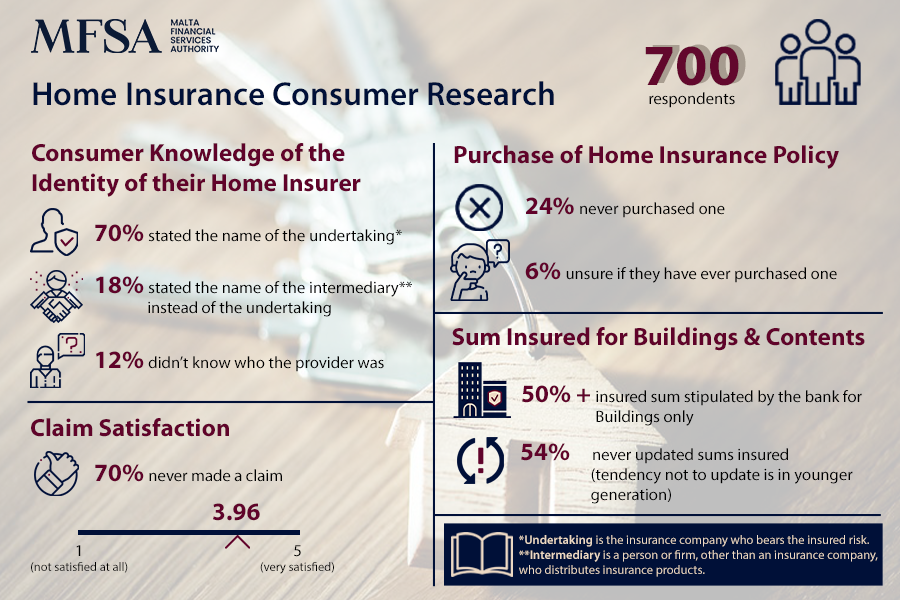
Payment Accounts with Basic Features
A Payment Account with Basic features is a basic bank account that allows, when legally residing in Malta or in another EU Member State that do not have other bank accounts in Malta, to have access to a set of banking services considered as essential, free of charge or at a reasonable cost.
AM I ELIGIBLE?
The payment account with basic features is available to anyone who is legally resident in Malta or in another EU Member State, including those whose status may mean they are not eligible for other banking products.
This means you can get this account even if you have no fixed address, if you are a refugee, stateless person or asylum seeker, or if you have not been granted a residence permit but cannot be sent back to your home country for legal or factual reasons.
Although you have a right to open a payment account with basic features, banks have an obligation to verify that you actually need this account for your day-to-day transactions.
WHAT IS A PAYMENT ACCOUNT WITH BASIC FEATURES?
A payment account with basic features is a bank account for personal use which offers basic banking services. This account may be available either free of charge or for a reasonable fee.
You will not be under any obligation to buy any other banking services from the bank in question in order to access your basic bank account.
WHAT CAN I DO WITH THIS ACCOUNT?
You will be given a debit card so that you can access the money in the account.
You will be able to withdraw your cash either from bank counters or from ATMs, in Malta and Gozo, and also in other EU Member States.
You will be able to make payments with your card, including online ones.
You will be able to transfer funds to other accounts, including regular payments (for example, through standing orders) – either from bank counters and ATMs, or via internet banking. You will also be able to set up direct debits to anywhere in the EU.
ARE THERE ANY ADDITIONAL FEATURES?
There may be other facilities which would become available to you depending on the bank with which the account is opened. For example, you might be entitled to an overdraft.
CAN THE ACCOUNT BE PROVIDED IN DIFFERENT CURRENCIES?
The account will be offered in Euro – at the least – but it is up to the bank to decide whether it will offer the account in the currency of another EU Member State.
HOW LONG DOES IT TAKE TO OPEN THIS TYPE OF ACCOUNT?
Banks have a maximum of 10 days in which to tell you whether your application was accepted or refused.
KEEP IN MIND THAT…
The account is only for personal use and cannot be used for business purposes. For example, you can receive your salary into the account, and you can use it to pay for your living expenses. But you cannot use it for a business, for a charity, for a club or society, or for any other organisation.
The law has introduced these accounts with basic features to ensure that everyone can – at the very least – access basic banking services. This means that if you already have a bank account, you might not be entitled to this type of account.
You might be able to open a payment account if you agree to close your existing one – but the bank has a right to verify that this has been done. If the bank finds out that you did have another account and that you did not close it, your payment account could be closed immediately.
Whatever your status, you will need to provide official proof of your identity before you can open the account. Banks are obliged to carry out background checks of all their customers so if you fail to provide the requested documents, your application may be turned down.
Banks have to abide by strict rules to prevent money-laundering and the funding of terrorism. These rules also require banks to screen any applicants for their services. If you do not pass this screening, the bank shall refuse to open your account. In addition, if you do not use the account for more than 24 months, the bank has the right to close it.
If a bank refuses to provide you with a payment account with basic features, it must inform you of the reason, in writing and free of charge. However, there are some cases where the bank is permitted, under the law, not to justify its refusal to open your account. These cases would relate to situations where the provision of such information would be prejudicial to national security, public policy or the bank’s anti-money laundering obligations.
Credit institutions shall not refuse to open a payment account with basic features on the basis of the consumers’ financial circumstances, including their employment status, level of income, credit history or personal bankruptcy.
WHICH BANKS MUST OFFER A PAYMENT ACCOUNT WITH BASIC FEATURES?
The obligation on banks comes from the Payment Accounts Regulations (Legal Notice 411 of 2016) – but it does not apply to all the banks in Malta.
Banks which have five or more branches in Malta must offer the payment account with basic features. They may also offer online accounts with the same features. Of course, other banks may offer this account – but they are not obliged to do so.
Specifically, you should find this account available at:
- APS
- BNF
- BOV
- HSBC
- Lombard


